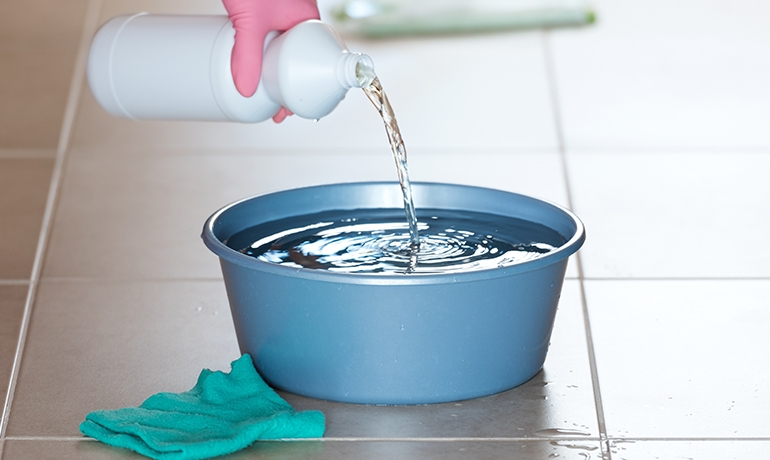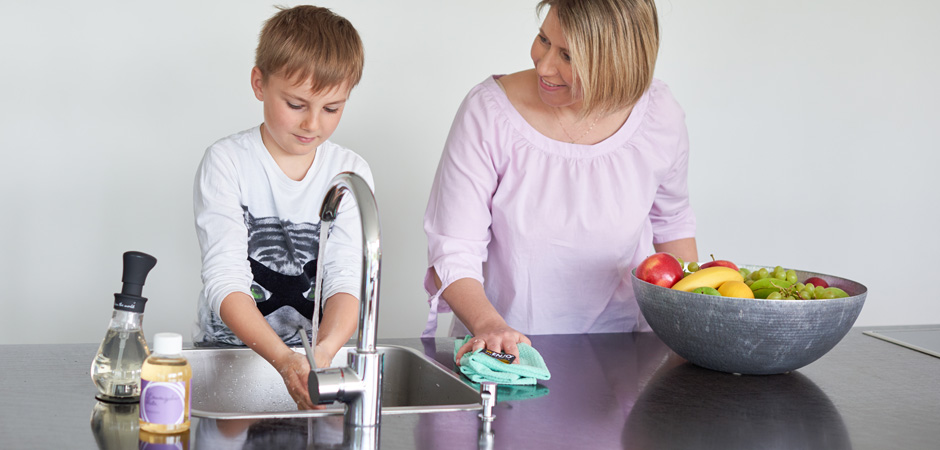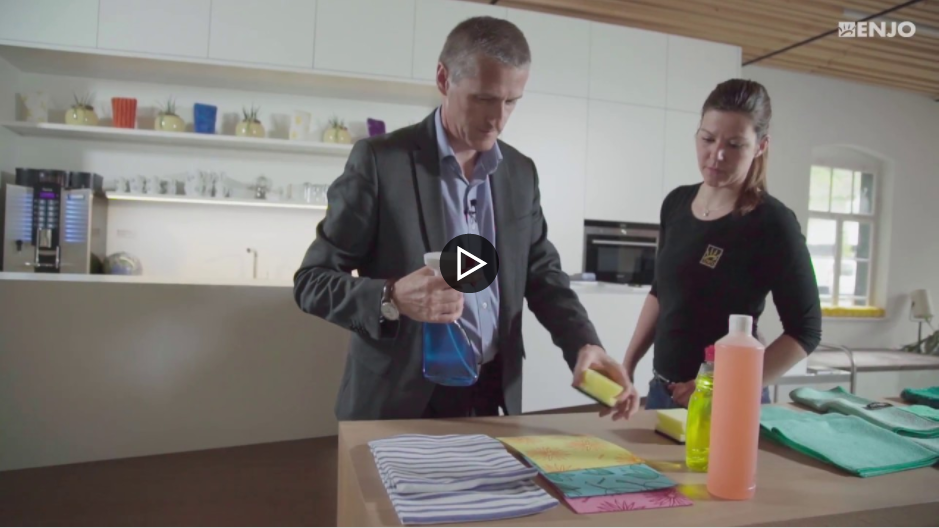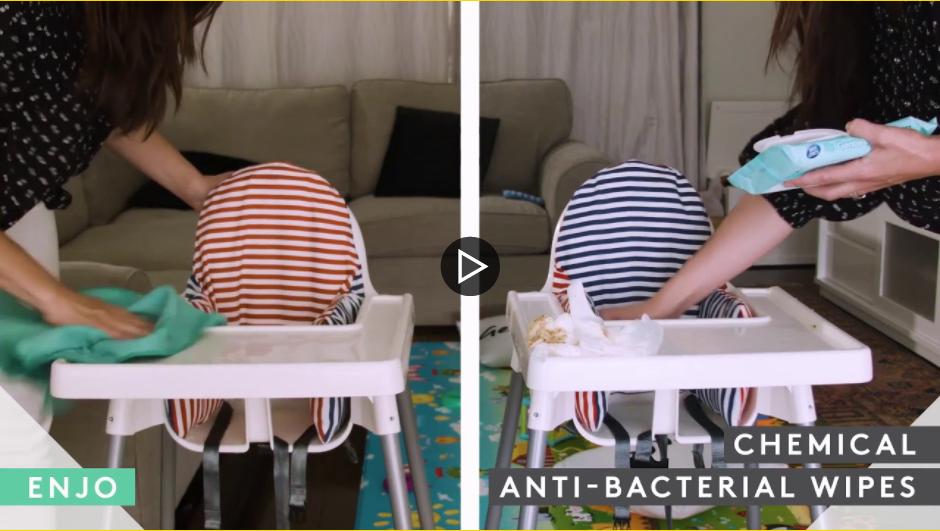How to create a safe and healthy home
- Nov 2, 2021, 15:11 PM by Lawrence Crew
Learn about the differences between cleaning and disinfecting, the best way to kill bacteria and top tips for keeping your home clean and safe
3812.jpg?sfvrsn=2b91dabd_2)
HOW TO CREATE A SAFE AND HEALTHY HOME
A clean home is important for good health and well-being, but how you clean your home makes a difference.
With health and hygiene a top priority, it’s important to understand how to clean your home effectively.
HOW WE CLEAN HAS CHANGED OVER TIME
Our grandparents cleaned with soap, water and a scrubbing brush. Over the last 60 years, the concept of using toxic chemicals with “anti-bacterial” properties on a daily basis has become “the norm”. Huge marketing budgets have been spent convincing us of the need to kill bacteria and disinfect our homes.
However, in recent years the need to use chemical cleaners in a normal home environment has been questioned. The implications of exposure to toxic chemicals on our health and immune systems has been called into question. Many doctors, scientists and health professionals are concerned that respiratory illnesses such as asthma, eczema and other immune type response conditions seem to be aggravated by over exposure to chemical cleaners in the home.
This has caused a debate over the excessive use of chemical cleaners and whether they are necessary in everyday cleaning.
For the last 30 years, ENJO has had a very clear message. It is not necessary to use chemical cleaners in order to clean.
WHAT’S THE DIFFERENCE BETWEEN CLEANING AND DISINFECTING?

CLEANING
Cleaning at its core is about removing dirt, grease, grime from surfaces. Cleaning regularly is important to maintain a healthy home as it keeps the level of germs and bacteria below a safe level. For example, certain cleaning tasks should be carried out daily, like cleaning the dishes, wiping down kitchen and bathroom surfaces.
Whereas cleaning your floors, kitchen (including appliances like your oven and fridge), cleaning your bathroom and dusting your living areas usually forms part of a weekly cleaning routine.
Some people choose to use chemical detergents to clean. However, with products like ENJO you can clean and physically remove dirt, grease and grime from surfaces just with ENJO and water. No chemical cleaners are needed.
Cleaning “pore-deep” using ENJOtex patented fibre technology has been shown to be SIX times cleaner than standard methods. [Research conducted using the ATP-Bioluminescence method – see below]
DISINFECTING
People often think disinfecting is cleaning, only better, but disinfecting a surface doesn't actually clean the surface at all.
Disinfectants are designed to destroy all organisms on a surface, this means using pretty powerful chemicals like bleach. However, there are a number of factors to remember when using disinfectant such as bleach:
It can become inactivated by:
- Microscopic organic debris.
- Using hot water.
- Not properly rinsing surfaces that have been cleaned.
Disinfecting will only be effective if:
- Correct contact time and dilution rates is adhered to
- Proper cleaning has taken place beforehand
WHEN SHOULD YOU DISINFECT YOUR HOME?
Disinfecting involves the use of toxic chemicals like bleach and is usually only recommended for special conditions for instance healthcare facilities like hospitals.
Q. Is disinfecting your home necessary as part of your regular cleaning routine?
A. No.
However, when someone is ill with a virus you may choose to disinfect surfaces to limit the spread of pathogens.
HOW WOULD YOU DISINFECT YOUR HOME IF YOU CHOSE TO?

Surfaces are required to be cleaned thoroughly before you disinfect. ENJO would be a great solution for this as you are then not using extra chemicals in conjunction with the disinfectant.
This is important because:
For instance, a toxic gas is produced when bleach is mixed with acidic detergents, causing fumes which lead to coughing, difficulty breathing and potentially long-term health problems.
Common disinfectants like bleach are harmful to touch, ingest and breathe in. Follow the label instructions carefully, improper use so mixing up stronger or weaker solutions may reduce the effectiveness or cause injury.
For correct dilution and contact times, refer to manufacturers instructions.
Unlike chemical cleaning products, ENJO fibres don't kill bacteria, but they do physically remove bacteria to safe levels effectively.
TOP TIPS FOR KEEPING YOUR HOME CLEAN AND SAFE

Use ENJO to clean your home
ENJO Fibres and cold water clean surfaces pore-deep, and are trusted by millions around the world to keep a home healthy. Contact your ENJOpreneur if you have any questions or concerns.
Remember to clean high-contact surfaces
Make sure you wipe down high contact surfaces like handles, switches, remote controls, mobile phones, keyboards etc. on a regular basis. Staying on top of your cleaning routine prevents germs from growing to unsafe levels.
Wash your hands regularly
We touch our faces on average 23 times an hour. Washing your hands frequently using proper hand washing techniques and keeping surfaces you touch regularly (including your phone) clean helps prevent the spread of germs. Wash your hands thoroughly for at least 20 seconds with soap.
Follow expert advice if someone is unwell
When someone is unwell it’s important to follow expert advice to prevent the spread of germs. This is especially important during a worldwide pandemic. Check the NHS website for the latest advice.
Keep your home well ventilated
If you do decide to use chemicals or wish to disinfect your home remember to follow the instructions carefully. Never mix different chemicals, store them safely and keep your home well ventilated.

